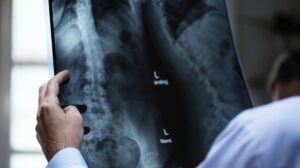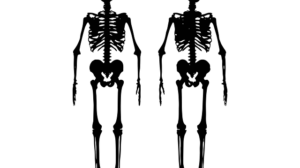As we age, our bones undergo natural changes, and maintaining bone health becomes essential to ensure a good quality of life. Healthy bones are the foundation of a strong and active body, enabling us to move freely and perform daily tasks without pain or limitations.
In this article, we will share 10 effective ways to keep your bones healthy and strong, going beyond the usual advice and incorporating essential details to ensure comprehensive bone care.
How to Keep Bones Healthy
A Balanced Diet: The Key to Strong Bones
The first way How to Keep Bones Healthy is balaced diet. A bone-healthy diet should include calcium, vitamin D, vitamin K, and magnesium.
Calcium is vital for bone mineral density, while vitamin D aids calcium absorption. Vitamin K is necessary for bone protein formation, and magnesium supports bone metabolism. Dairy products, leafy greens, fish, nuts, and seeds are excellent sources of these nutrients.
Engage in Weight-Bearing Exercises
The next way How to Keep Bones Healthy is enganging weight-bearing exercises. Activities such as walking, jogging, dancing, and strength training place stress on bones, stimulating bone-building cells and improving bone density. These exercises are especially important for postmenopausal women and older persons to reduce the risk of osteoporosis and bone fractures.
Avoid Smoking and Limit Alcohol Consumption
The next way How to Keep Bones Healthy is quit smoking and alcohol consumption. Smoking negatively affects bone health by reducing blood flow to bones and interfering with the absorption of essential nutrients like calcium.
Additionally, excessive alcohol consumption can lead to bone loss and an increased risk of fractures. For optimal bone health, it’s crucial to quit smoking and moderate alcohol intake.
Say No to Crash Diets
The next way How to Keep Bones Healthy is say no to crash diets. Crash diets can be harmful to bone health, as they often lead to nutrient deficiencies and muscle loss. When the body lacks essential nutrients, it draws upon the calcium stored in bones, weakening them over time.
Opt for a sustainable and balanced approach to weight loss, focusing on nourishing your body with the right nutrients.
Get Regular Health Check-ups
The next way How to Keep Bones Healthy is get regular health check-ups. While the source article didn’t touch upon health check-ups, they play a crucial role in bone health. Regular screenings can identify bone-related issues like osteoporosis at an early stage, allowing for timely interventions and preventive measures.
Consult with your healthcare provider to determine the appropriate screening schedule based on your age, risk factors, and medical history.
Incorporate Bone-Building Herbs and Spices
The next way How to Keep Bones Healthy is incorporate bone-building herbs and spices. In addition to a balanced diet, certain herbs and spices have bone-strengthening properties. Turmeric, a well-known anti-inflammatory spice, contains curcumin, which may support bone health by reducing bone loss and promoting bone formation.
Likewise, ginger is believed to have anti-osteoporotic effects, enhancing bone density. Including these spices in your cooking can be beneficial for your bones.
Reduce High Salt and Caffeine Intake
The next way How to Keep Bones Healthy is reduce high salt and certain caffeine intake. Consuming excessive salt can lead to increased calcium excretion in the urine, negatively impacting bone health.
Similarly, excessive caffeine intake can interfere with calcium absorption. It’s essential to be mindful of the salt content in processed foods and reduce caffeine consumption to support your bone health.
Manage Stress Levels
The next way How to Keep Bones Healthy is managing stress levels. Stress can have adverse effects on overall health, including bone health. Chronic stress triggers the release of cortisol, a hormone that can lead to bone loss over time. Engaging in stress-reducing activities like meditation, yoga, or spending time in nature can contribute to maintaining healthy bones.
Ensure Sufficient Sleep
The next way How to Keep Bones Healthy is get enough sleep. Quality sleep is essential for bone health, as it allows the body to repair and regenerate tissues, including bones.
During sleep, the body releases growth hormones, which are crucial for bone remodeling and maintaining bone density. Aim for 7-9 hours of uninterrupted sleep each night to promote optimal bone health.
Consider Bone-Boosting Supplements
The next way How to Keep Bones Healthy is taking supplements. In some cases, it may be challenging to obtain all the necessary nutrients solely from diet.
In consultation with your healthcare provider, consider bone-boosting supplements like calcium, vitamin D, and magnesium. However, it’s essential to avoid excessive supplementation, as it can have adverse effects on health.
Most Commonly Asked Questions about Bone Health
How can I increase my bone density naturally?
Increasing bone density naturally involves adopting a healthy lifestyle and incorporating specific habits into your daily routine. Firstly, ensure a balanced diet rich in calcium, vitamin D, magnesium, and vitamin K, which are essential for bone health.
Engaging in weight-bearing exercises, such as walking, jogging, and strength training, stimulates bone-building cells and enhances bone density.
Quit smoking and moderate alcohol intake, as these habits can weaken bones. Get regular health check-ups to monitor bone health and address any issues promptly.
Finally, prioritize sufficient sleep and manage stress levels, as both play a significant role in maintaining strong and healthy bones. By combining these practices, you can effectively boost your bone density naturally.
Are weight-bearing exercises suitable for everyone, including older persons?
Weight-bearing exercises can be suitable for most people, including older persons, but it is essential to consider individual health conditions and fitness levels.
Engaging in weight-bearing activities helps improve bone density and overall strength, which is particularly beneficial for older persons at risk of osteoporosis and bone fractures.
However, older persons should consult with their healthcare provider before starting any exercise program to ensure it is safe and appropriate for their specific health needs.
In some cases, modifications or low-impact alternatives may be recommended to reduce the risk of injury while still gaining the benefits of weight-bearing exercises.
What foods are rich in calcium and vitamin D?
Foods rich in calcium include dairy products such as milk, yogurt, and cheese. Additionally, leafy green vegetables like kale, broccoli, and bok choy are excellent sources of calcium.
Fortified plant-based milk, tofu, almonds, and sardines with bones are also calcium-rich options. When it comes to vitamin D, fatty fish like salmon, mackerel, and tuna are good sources.
Egg yolks and fortified foods such as orange juice, cereals, and some dairy alternatives also provide vitamin D. Exposure to sunlight is another natural way to boost vitamin D levels as the skin synthesizes this essential nutrient when exposed to sunlight.
Can I improve my bone health through diet alone, or do I need supplements?
Improving bone health through a balanced diet is essential and often sufficient for many individuals. A diet rich in calcium, vitamin D, magnesium, and other bone-boosting nutrients can support bone density and overall health.
However, some individuals, especially those with specific dietary restrictions or medical conditions, may find it challenging to obtain adequate nutrients solely from their diet. In such cases, supplements may be beneficial under the guidance of a healthcare provider.
While supplements can fill nutrient gaps, it’s crucial not to rely solely on them and to continue prioritizing a well-rounded diet to ensure optimal bone health.
Consulting with a healthcare professional can help determine individual needs and the appropriate use of supplements for improving bone health.
Is osteoporosis preventable, and what are the risk factors?
Osteoporosis is not entirely preventable, but certain lifestyle choices can significantly reduce the risk of developing this condition.
Maintaining a healthy diet rich in calcium and vitamin D, engaging in regular weight-bearing exercises, and avoiding smoking and excessive alcohol consumption are crucial preventive measures.
Additionally, adequate intake of other essential nutrients, such as vitamin K and magnesium, can also contribute to bone health. While genetics plays a role in osteoporosis risk, lifestyle factors are key in minimizing the likelihood of developing the condition.
The risk factors for osteoporosis include advanced age, being female, having a family history of the disease, being of Caucasian or Asian descent, having a small body frame, low estrogen levels (in women), certain medical conditions, and prolonged use of certain medications like corticosteroids.
By addressing modifiable risk factors and adopting a bone-healthy lifestyle, individuals can significantly reduce their risk of osteoporosis.
Bottom Line
Maintaining healthy and strong bones is crucial for overall well-being and a high quality of life. By following these ten effective ways to support bone health, you can reduce the risk of osteoporosis and fractures, ensuring that your bones remain robust and capable of supporting an active lifestyle.
Remember to combine a balanced diet, weight-bearing exercises, stress management, and regular health check-ups to enjoy optimal bone health throughout your life.
![Empower Yourself: Overcoming Greenstick Fractures with Expert Advice [Causes, Symptoms, and Treatment] 1 Empower Yourself: Overcoming Greenstick Fractures with Expert Advice [Causes, Symptoms, and Treatment]](https://markethealthbeauty.com/wp-content/uploads/2020/10/Greenstick-Fracture-300x168.jpg)



